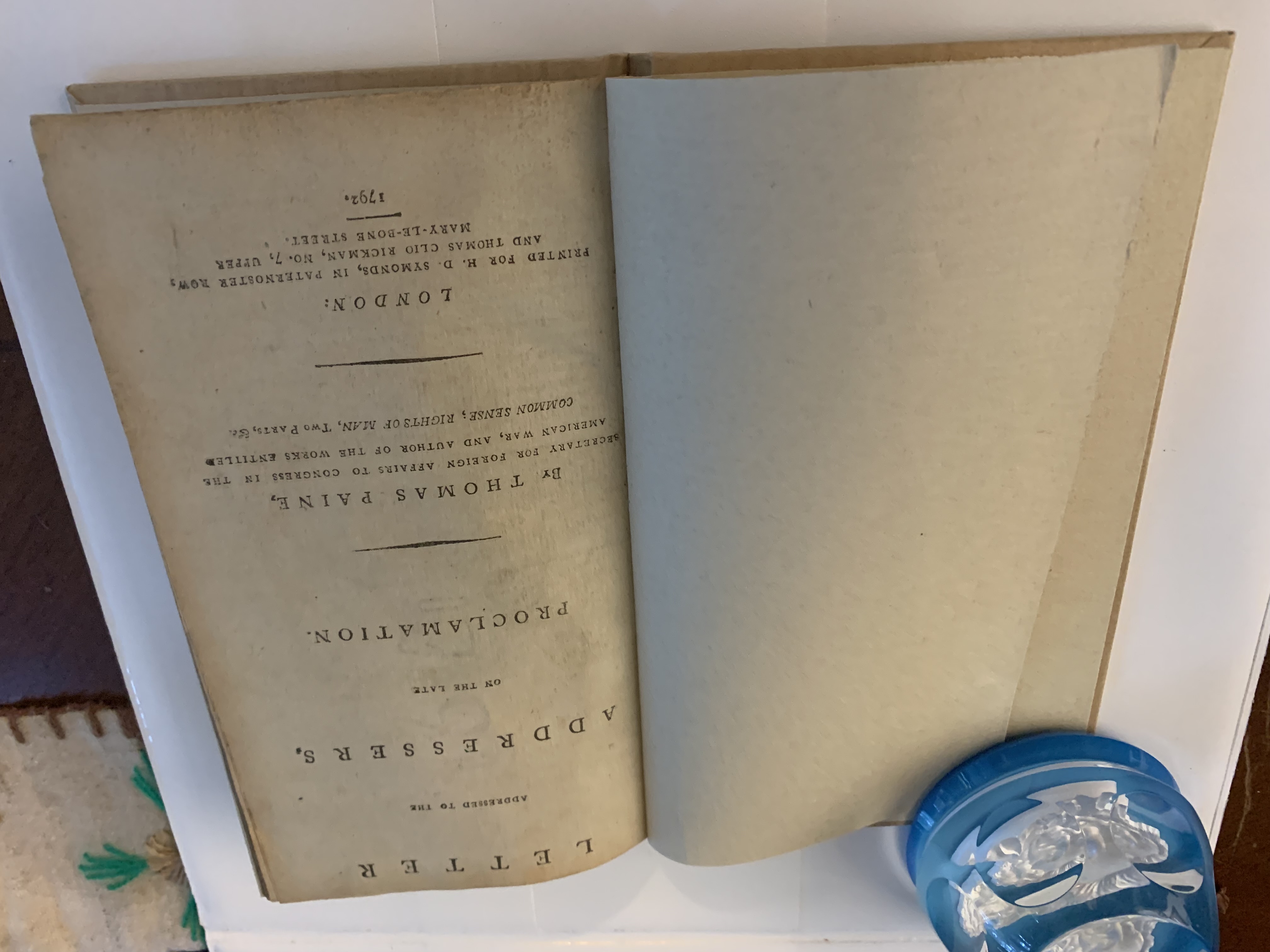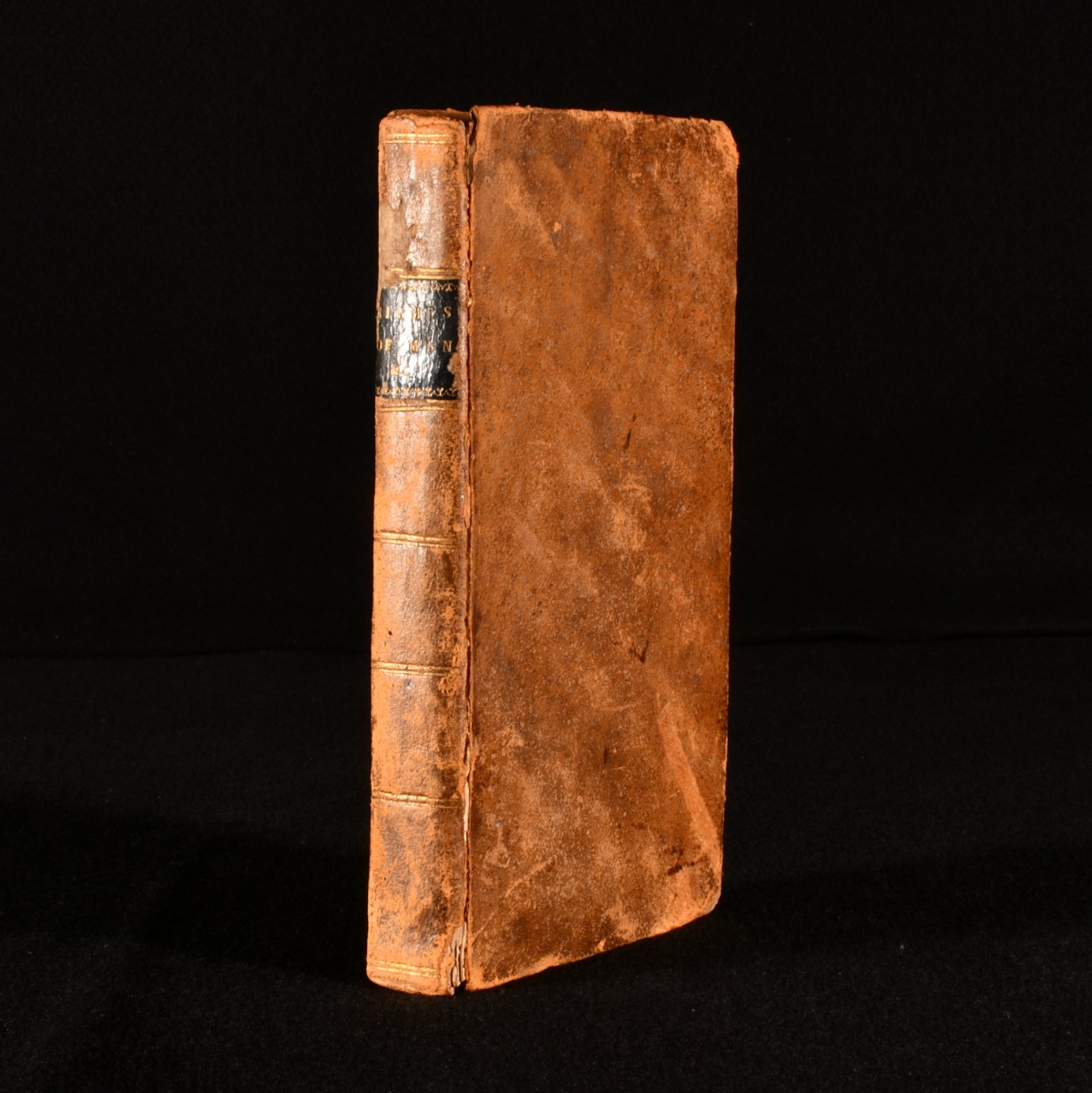Available Copies from Independent Booksellers

Price: US$600.00 + shipping
Condition: Fair
Description: Salmon paper wraps are soiled & rubbed from handling; chips missing from corners, ends of spine & a 1/2 spot in center of spine; 2" tear at lower edge of front panel. 91pp including Appendix, letter to M de la Fayette, preface & an advertisement for Common Sense. Previous owner's signatures, tanned pages & foxing throughout, irregularly cut pages; all quite legible. Protected in mylar sleeve.
Seller: Shaker Mill Books, W. Stockbridge, MA, U.S.A.

Price: US$1170.00 + shipping
Condition: Very Good
Description: Thomas Paine, Rights of Man Being an Answer to Mr. Burke s Attack on the French Revolution, London: J. S. Jordan (vol. 1) and H. D. Symonds (vol. 2) 1792. Two hardbound volumes. Written before the French Revolution went awry and literally almost took his head, this is Paine s seminal work of political discourse wherein he both showed the weaknesses and absurdity of monarchy, and contended for the creation of what is now known as the welfare state. This work rebutted Edmund Burke's case for monarchy and bolstered American and British support for the French Revolution. Paine contended that government aid is not charity, but an obligation of the state whether a monarchy or democracy. Paine argued for both individual rights and society s well-being. He fervently contended that crippling poverty undermines the rights of an individual, and consequently the legitimacy of government. Paine emphasized education and tax reform, calling for progressive taxes on property. Paine noted that the poor consists mostly of children and the elderly, who are unable to work. Delving into the details, Paine observed that England's population was roughly 7 million. He posited that around one-fifth of the population or 1,400,000 people were so poor as to need support. Paine s plan for financing relief was to cut military expenditures and redirect those funds to ending poverty. Paine mathematically backed up his proposal. As the author of Common Sense (1776), Rights of Man (1791, 1792), Age of Reason (1794), and The [American] Crisis (1776-1783), Paine was far ahead of his times as a political and economic thinker and essayist. Having left school when he was 12, Thomas Paine, the son of a corset maker trained to take-up that occupation, revealed no genius as he went from job to job. But on January 10, 1776, a month before he turned 39, Paine exploded onto the transatlantic stage as the foremost advocate of obtaining liberty for the colonies by fighting the British. Paine himself commented that any literary talent he might have had was buried in me and might ever have continued so, had not the necessity of the times dragged and driven him to write. (The Crisis, No. VIII, ¶6.)
Seller: Paines Pen, Guerneville, CA, U.S.A.

Thomas Paine. Letter Addressed to the Addressers on the Late Proclamation. H. D. Symonds, 1792.
Price: US$1170.00 + shipping
Condition: Near Fine
Description: Thomas Paine, Letter Addressed to the Addressers on the Late Proclamation, London: H. D. Symonds 1792. Before the French Revolution went awry and literally almost took his head, Paine wrote The Rights of Man, his seminal work of political discourse wherein he both showed the weaknesses and absurdity of monarchy, embraced representative government as the best form of government, and contended for the creation of what is now known as the welfare state. Many English monarchists and aristocrats publicly decried The Rights of Man. Based on published reports, Paine figured that three hundred and twenty gatherings at which his work was attacked had been held and calculated that but thirty-two thousand had heard those challenges. (At p. 13.) He wrote the instant volume to defend his name and ideas. Regarding his work, Paine contended: If Rights of Man were a book that deserved the vile description which promoters of the Address have given of it, why did not these men prove their charge, and satisfy the people, by producing it, and reading it publicly? This most certainly ought to have been done, and would also have been done, had they believed it would have answered their purpose. But the fact is, that the book contains truths which those time-servers dreaded to hear, and dreaded that the people should know; and it is now following up the Addresses in every part of the nation, and convicting them that his words are false or arguments wrong. (At p. 13.) As the author of Common Sense (1776), Rights of Man (1791, 1792), Age of Reason (1794), and The [American] Crisis (1776-1783), Paine was far ahead of his times as a political and economic thinker and essayist. Having left school at 12, Thomas Paine, the son of a corset maker trained to take-up that occupation, revealed no genius as he went from job to job. But on January 10, 1776, a month before he turned 39, Paine exploded onto the transatlantic stage as the foremost advocate of obtaining liberty for the colonies by fighting the British. Paine himself commented that any literary talent he might have had was buried in me and might ever have continued so, had not the necessity of the times dragged and driven him to write. (The Crisis, No. VIII, ¶6.) This hardbound volume is from the edition printed at Paine s behest. We understand that Paine sent Symonds the manuscript and requested that he print it and that this is the first edition but acknowledge that some question exists as to whose edition was first. All pages are intact, no one has written upon them.
Seller: Paines Pen, Guerneville, CA, U.S.A.

Price: US$4361.09 + shipping
Condition: Very Good
Description: A sammelband of five pamphlets by Thomas Paine, including his two most important and influential works, 'Common Sense' and 'Rights of Man'. A sammelband of five pamphlet treatises by Thomas Paine.Containing;'Rights of Man', Parts I and II, published by H. D. Symonds in London in 1792, early editions published in the same year as the first. One leaf of adverts to the rear of Part I.'Two Letters to Mr. Henry Dundas with Two Letters to Lord Onslow', published by L. Wayland in London in 1792.'Common Sense', published by J. Ridgway in London in 1792, a new edition of this work'The Decline and Fall of the English System of Finance', published by Hartley, Adlard and Son in Paris in 1796. Half-title present.'Rights of Man' is a massively influential work, written in the midst of the French Revolution. The work is a collection of articles that attacks Edmund Burke's 1790 work 'Reflections of the Revolution in France'. Burke's work was an intellectual attack on the Revolution. Paine argues that political revolution is permissible when a government doesn't safeguard the rights of its people.'Common Sense' is equally influential, advocating independence from Britain, published at the beginning of the American Revolution. Upon publication it became an immediate sensation, being read aloud in taverns and meeting places. In a full calf binding. Externally, generally smart, with some rubbing and marks to the boards and spine. Minor bumping to the spine and extremities. Small cracks to the joints. A small amount of loss to the spine label. Internally, firmly bound. Pages are lightly age-toned and generally clean with some spots. Very Good
Seller: Rooke Books PBFA, Bath, United Kingdom